Introduction
The use of natural chemicals in weight loss has become increasingly popular in recent years. Celery juice and peanut butter have emerged as well-liked options among them. These components boast distinct nutritional profiles and are often touted as supportive of weight loss efforts. However, it begs the question: Is Celery and Peanut Butter Good for Weight Loss? or has the allure stemmed from dietary fads?
Celery, renowned for its low-calorie and high-fiber attributes, is a staple in many weight loss regimens. Despite being low in calories, a single celery stalk is rich in fiber, vitamins, and minerals. On the other hand, despite its calorie density, peanut butter is abundant in protein, healthy fats, and essential nutrients. These elements form a nutritious duo that may contribute to weight loss goals.
The central query guiding this discourse revolves around the efficacy of Celery and peanut butter in weight loss. While these substances offer unique nutritional advantages, further research must ascertain their impact on weight loss. Through a deeper dive into scientific studies and exploring the interaction between these ingredients and weight management, we aim to determine whether celery and peanut butter truly aid in weight loss or if their popularity is merely a result of dietary trends.
Nutritional Benefits of Celery and Peanut Butter
A. Nutritional Profile of Celery
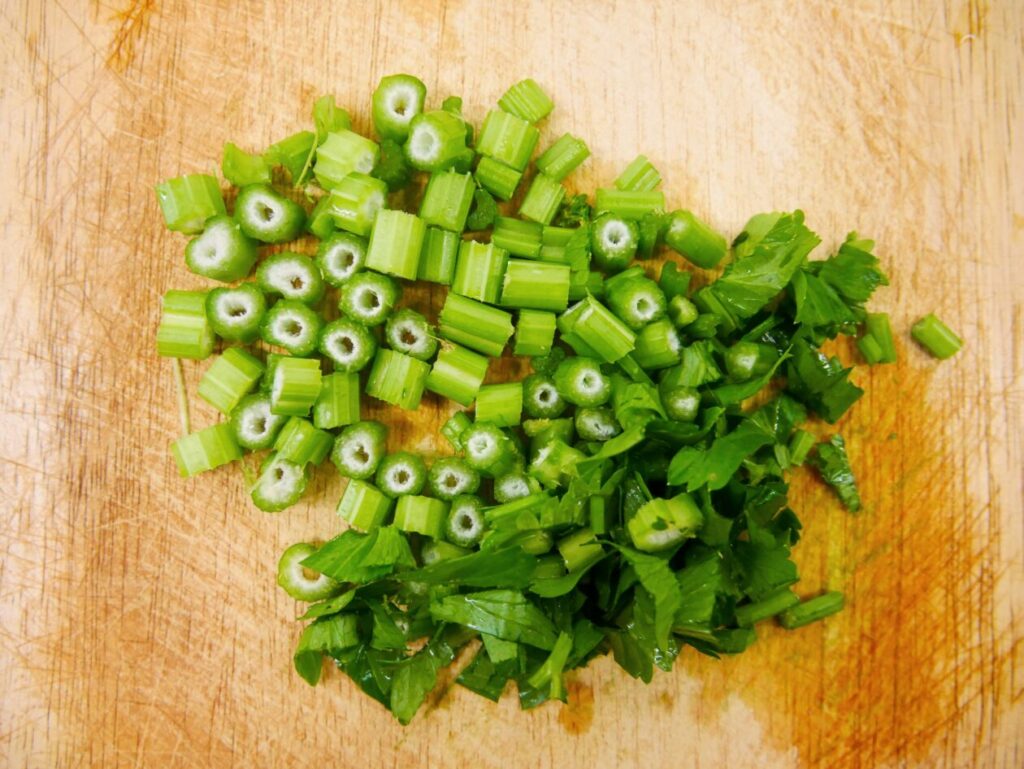
Celery Nutrition Facts:
One medium (7 1/2″ to 8″ long) celery stalk (40g) contains 5.6 calories, 1.2g carbohydrates, and 0.3g protein. (USDA):
- Calories: 5.6
- Fat: 0.1g
- Sodium: 32mg
- Carbohydrates: 1.2g
- Fiber: 0.6g
- Sugars: 0.5g
- Protein: 0.3g
- Potassium: 104mg
- Sodium: 32mg
- Phosphorus: 9.6mg
- Potassium: 104mg
- Vitamin A: 8.8mcg
- Folate: 14.4mcg
- Vitamin K: 11.7mcg
Low-Calorie Content: Celery’s exceptionally low-calorie content is one of the main reasons it is frequently recommended as a food that helps with weight loss. Celery adds a nice crunch to food without significantly increasing daily calorie consumption; a stalk has about ten calories.
High Fiber and Water Content: Since Celery is primarily made of water, it is a hydrating snack choice. It also has a high dietary fiber content, which facilitates digestion and increases feelings of fullness. In addition to keeping you hydrated, this mix of water and fiber promotes a healthy digestive system and may help control your hunger.
Vital Vitamins and Minerals: Celery is a low-calorie food bursting with critical vitamins and minerals, such as potassium, C, vitamin K, and folate. These nutrients contribute to overall well-being by being essential for several body processes, including immune system function, blood pressure regulation, and bone health.
B. The Nutritional Profile of Peanut Butter
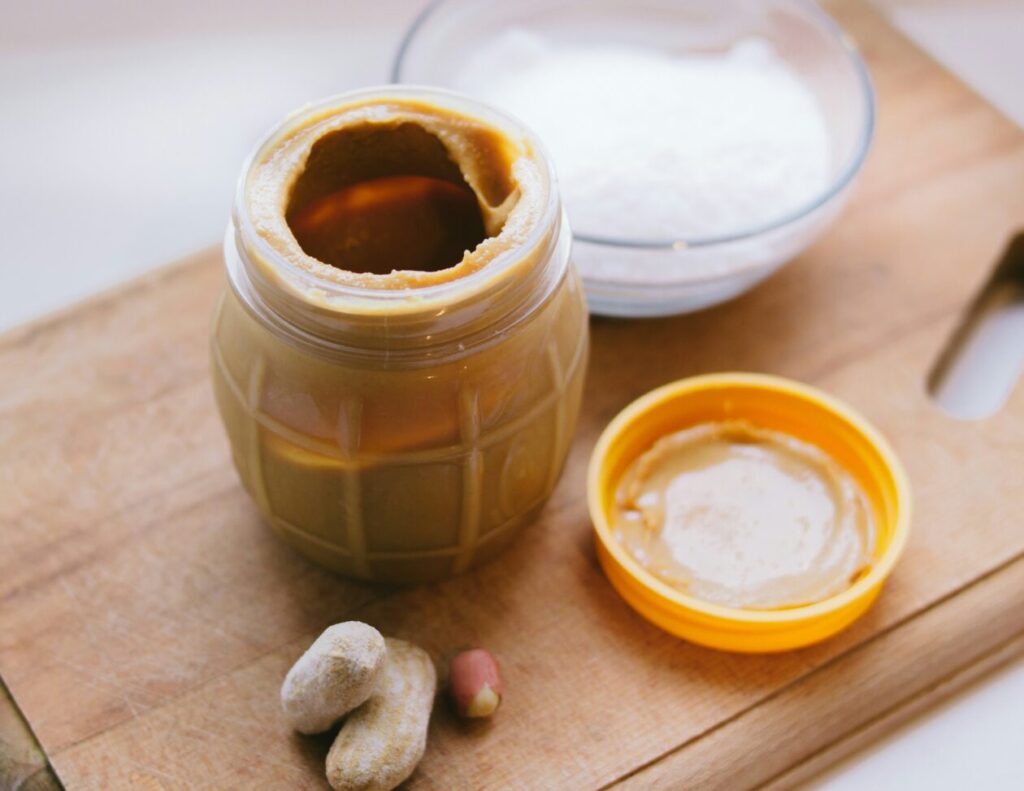
Peanut butter nutrition includes 190 calories per 2 tablespoon serving, with 16g of fat, 8g of carbs, 2g of fiber, and 7g of protein. Peanut butter is high in healthy fats, folate, potassium, vitamin E, and B vitamins. ( USDA ) Two tablespoons (32g) of smooth peanut butter with added salt.
- Calories: 190
- Fat: 16g
- Sodium: 136mg
- Carbohydrates: 8g
- Fiber: 2g
- Sugars: 3g
- Protein: 7g
High Protein Content: Peanut butter is well-known for having a high protein content, which makes it a useful supplement to diet plans for maintaining or losing muscle mass. Protein can increase feelings of fullness and decrease cravings, which may help people eat fewer calories throughout the day and feel fuller for longer.
Nutritious Fats: Peanut butter’s fat content makes it high in calories, but the fats are mostly heart-healthy monounsaturated and polyunsaturated. When ingested in moderation, these fats can promote metabolic health and feelings of fullness, making peanut butter a wholesome and fulfilling option for individuals trying to control their weight.
Vital Vitamins and Minerals: Vitamin E, magnesium, and phosphorus are among the essential vitamins and minerals found in peanut butter, in addition to the fat and protein it contains. These elements further enhance peanut butter’s nutritional worth as a weight loss-friendly option because they are essential for energy production, muscle function, and general vigor.
A balanced diet that includes Celery and peanut butter can offer several nutritional advantages that aid in weight loss. Celery provides low-calorie nutrition, fiber, and hydration, while peanut butter adds protein, healthy fats, and extra vitamins and minerals to support fullness and general health. Thoughtful and portion-controlled integration of these nutrients can improve dietary diversity and support long-term weight management objectives.
Scientific Evidence for Weight Loss Benefits
A. Peanut Butter’s Role in Weight Loss
Research Showing Peanut Butter Can Reduce Hunger and Boost Fullness: Consuming peanut butter may help reduce appetite and boost feelings of fullness, which can support weight loss efforts, according to research. Compared to those who ate low-fat, high-carbohydrate snacks, study participants who consumed peanut butter reported feeling more satisfied and having less appetite. The results were published in the British Journal of Nutrition.
Impact of Peanuts and Peanut Butter on Total Weight Control: Studies have linked peanut butter, which is high in calories, to weight reduction and weight control. Their high protein and fiber content, which encourage fullness and may decrease calorie intake throughout the day, is one explanation for this. Furthermore, peanuts’ beneficial fats can support better metabolic health and increased fat burning.
B. Celery’s Role in Weight Loss
Low-Calorie Density and High Fiber Content: Celery is a well-liked option for people trying to reduce weight because of its low-calorie density and high fiber content, which are frequently complimented. Celery adds weight to the diet without adding many calories because it is mostly composed of water, with only a few calories per stalk. Additionally, the fiber it contains facilitates digestion and increases feelings of fullness, which can help reduce overeating.
Contribution to Reduced Calorie Consumption and Fullness Feelings: Celery’s high water and fiber content helps to encourage feelings of fullness and lower total calorie consumption. Celery can help people feel fuller after consuming fewer calories during meals or snacks, which could help them reach their weight loss objectives.
Bust the Myth of “Negative Calorie Foods”: Celery is sometimes referred to as a “negative calorie food” since it is thought to need more energy for digestion than it gives. However, this idea is false. Although Celery has few calories and may need some energy to break down, this is insignificant when considering the total number of calories in Celery. Sustainable weight loss requires adding nutrient-dense, whole foods like Celery into a balanced diet rather than depending solely on “negative calorie foods.”
To summarize, when incorporated into a well-balanced diet, the distinct nutritional advantages of both Celery and peanut butter can aid in weight loss. Celery’s high fiber level and low-calorie density increase feelings of fullness and lower calorie consumption. In contrast, peanut butter’s high protein and healthy fat content may help suppress hunger and promote Satiety. Eating these meals in moderation and with awareness can help improve general health and well-being and aid in weight loss.
Using Peanut Butter and Celery Together to Lose Weight
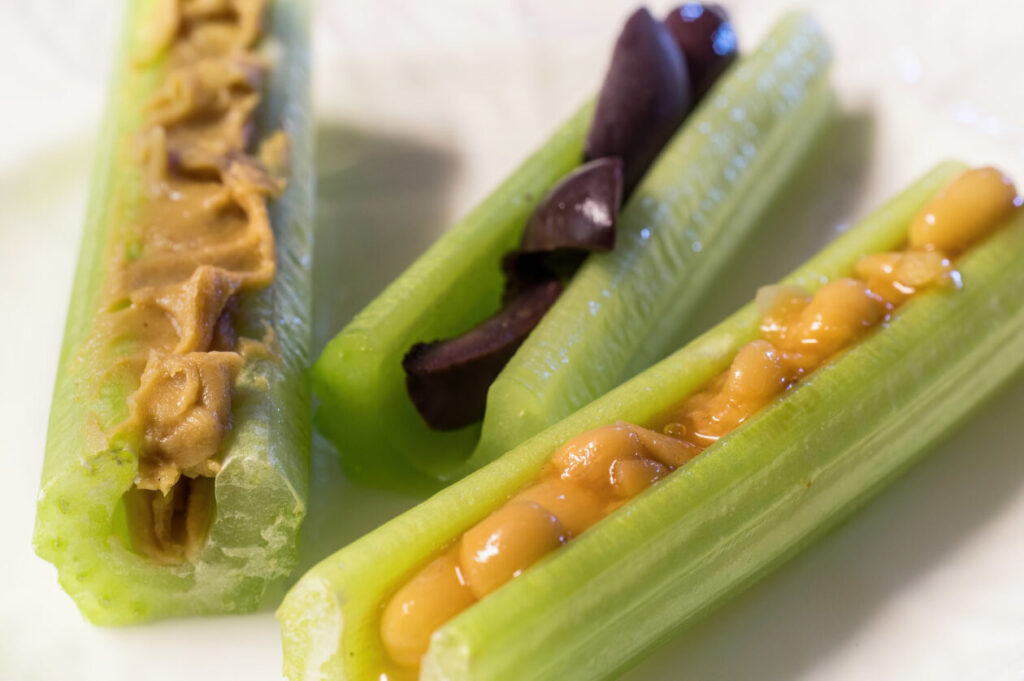
A. Synergistic Effects of Celery and Peanut Butter
Balanced nutrient Combination: The combination of Celery and peanut butter provides a range of balanced nutrients and supports weight control initiatives. Celery promotes fullness without adding many calories because it is high in water and fiber and low in calories. Conversely, peanut butter offers healthy fats and protein necessary for sustaining energy levels and Satiety throughout the day. Combined, they make a filling snack that can help reduce cravings and stop overindulging.
Enhanced Satiety and hunger management: The high fiber content of Celery and peanut butter’s protein and fat content combine to provide a synergistic effect that improves satiety and hunger management. Since fiber and protein make us feel fuller for longer periods and slow down the stomach’s emptying process, they may help us consume fewer calories overall. If you include Celery and peanut butter in your diet, you could find it simpler to maintain your weight loss goals and have more irregular hunger sensations.
B. Potential Strategies for Incorporating Celery and Peanut Butter into a Weight Loss Diet
Portion control and mindful eating: Although high in nutrients, foods like peanut butter and Celery are high in calories, particularly when ingested in large amounts. Use portion control and careful eating to benefit from them for weight loss. To enjoy the flavors and textures completely, choose a serving size that aligns with your calorie objectives and deliberately savor each bite.
Substitution for Less Nutritious Snack Options: Celery and peanut butter are better substitutes for manufactured snacks that are heavy in sugar and bad fats. For a filling snack that fuels your body and aids in weight loss, try celery sticks covered with a dollop of peanut butter instead of chips, cookies, or candies.
Different Ways to Eat Peanut Butter with Celery as a Snack: Try preparing different ways to eat Celery and peanut butter to make your snacks tasty and engaging. Try spreading peanut butter over celery sticks and adding sliced fruit or nuts for extra taste and nutrition. Alternatively, for a sweet and protein-rich snack, use Celery as a crisp vehicle for dipping into peanut butter with Greek yogurt or honey.
C. Is Celery and Peanut Butter Good for Weight Loss?
In Short: Yes. By incorporating Celery and peanut butter into a well-rounded diet and lifestyle, individuals can enjoy their nutritional benefits while supporting their weight loss goals healthily and sustainably.
In Detail: Celery and peanut butter can benefit weight loss when consumed as part of a balanced diet. Due to its high fiber, water content, and low-calorie count, Celery helps you feel fuller for longer and consume fewer calories overall. Protein and good fats in peanut butter help control blood sugar levels and reduce cravings. Together, they provide a filling snack that can help with weight loss by reducing appetite and avoiding overindulging.
Summary: In conclusion, Celery and peanut butter provide a wholesome and filling choice for anyone trying to reduce weight. Celery and peanut butter work together to promote better snack choices by maximizing the benefits of their nutrients—such as fiber, protein, and healthy fats—and enhancing Satiety. Including them in your diet with awareness, controlling portion sizes, and consuming different foods can help you lose weight.
Choosing The Right Peanut Butter
Choosing the right peanut butter is essential when including Celery and will help you lose weight. The added sugars, processed salts, and even trans fats found in many commercially available brands can make it difficult to lose weight. Make sure you’re choosing healthfully by carefully reading ingredient lists.
Choose peanut butter that has just peanuts as an ingredient. Steer clear of goods with unknown preservatives or additives. Fortunately, natural peanut butter is now readily available in most grocery shops due to the growing demand for choices free of additives. If you can’t find one that works well, try making your own by processing raw shelled peanuts in a food processor or high-speed blender until they become creamy and smooth. You can assist your weight reduction objectives and optimize the nutritional advantages of your Celery and peanut butter snack by selecting the proper kind of peanut butter.
Celery and Peanut Butter Recipe for Weight Loss
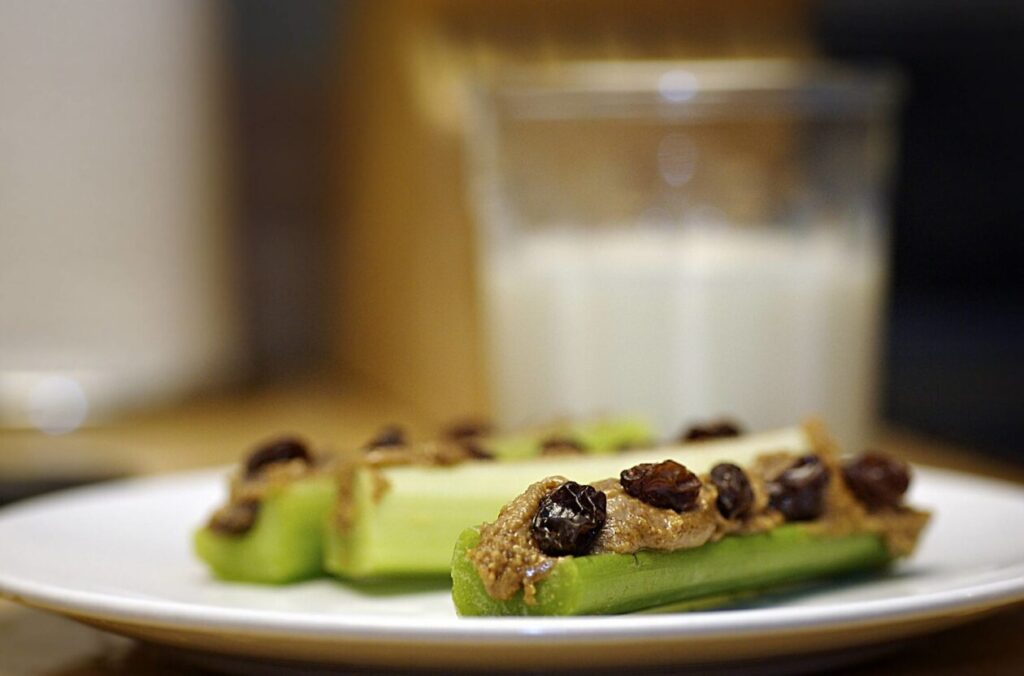
Looking for a delicious and nutritious snack that can aid in your weight loss journey? Look no further than the classic combination of Celery and peanut butter. This simple yet satisfying snack is easy to prepare and packed with essential nutrients to support your health and wellness goals.
Ingredients:
- Fresh celery stalks
- Natural peanut butter (unsweetened and no added oils, if possible)
Instructions:
- Wash the celery stalks thoroughly under cold water and pat them dry with a clean kitchen towel.
- Trim off the ends of the celery stalks and cut them into manageable lengths, typically around 4-5 inches long.
- Take a generous scoop of natural peanut butter and spread it along the center groove of each celery stalk. Ensure the peanut butter layer is thick enough to provide a satisfying taste.
- Optionally, you can sprinkle some chia seeds or flaxseeds on top of the peanut butter for added nutritional benefits and texture.
- Arrange the prepared celery sticks on a serving plate and enjoy them immediately, or refrigerate for a refreshing and crunchy snack later.
Tips for Weight Loss:
- Opt for natural peanut butter without added sugars or oils to keep the calorie count in check.
- Be mindful of portion sizes. While Celery and peanut butter are nutritious, they can be calorie-dense if consumed in large quantities.
- Incorporate this snack into your balanced diet as part of a larger meal, or enjoy it as a midday pick-me-up to curb cravings and keep hunger at bay.
- For variety and flavor, experiment with different nut butter options like almond or cashew butter.
Benefits:
- High in fiber: Celery provides a satisfying crunch and is rich in dietary fiber, which aids in digestion and promotes feelings of fullness.
- Protein-packed: Peanut butter is a good source of plant-based protein, which helps support muscle repair and maintenance, essential for a healthy metabolism.
- Nutrient-rich: Together, celery and peanut butter offer a range of essential vitamins, minerals, and antioxidants, contributing to overall well-being.
Incorporate this simple and wholesome celery and peanut butter recipe into your daily routine to support your weight loss goals while enjoying a delicious and nutritious snack.
FAQ Section: Celery and Peanut Butter for Weight Loss
- Does celery and peanut butter help you lose weight?
- Yes, celery and peanut butter can aid in weight loss when incorporated into a balanced diet. Celery is low in calories and fiber, promoting satiety, while peanut butter provides protein and healthy fats, which help control appetite and stabilize blood sugar levels.
- How many calories are in 2 stalks of Celery with peanut butter?
- Two celery stalks with one tablespoon of peanut butter contain approximately 110-120 calories, depending on the brand and type used.
- Does eating Celery every day help you lose weight?
- Eating Celery daily can contribute to weight loss due to its low-calorie and high-fiber content. However, it’s essential to incorporate various nutritious foods into your diet for overall health and balanced nutrition.
- Is it okay to eat peanut butter every day for weight loss?
- While peanut butter can be part of a healthy diet, consuming it in moderation is essential due to its calorie density. Opt for natural peanut butter without added sugars or hydrogenated oils, and be mindful of portion sizes to support weight loss goals.
- How much Celery should I eat a day to lose weight?
- There’s no specific recommendation for the amount of Celery to eat daily for weight loss. Incorporate Celery into your meals and snacks as part of a balanced diet, focusing on variety and portion control.
- Does Celery melt fat?
- Celery does not directly “melt” fat. However, it is low in calories and high in water and fiber, which can support weight loss efforts by promoting satiety and reducing overall calorie intake.
- Why does Celery burn fat?
- Celery doesn’t have special fat-burning properties. Its low-calorie and high-fiber content may contribute to weight loss by promoting fullness and reducing calorie consumption as part of a balanced diet.
- How many calories are in 2 celery sticks?
- Two celery sticks typically contain 10-15 calories, making them a low-calorie snack.
- How many calories is Celery with peanut butter?
- Celery with peanut butter typically ranges from 50 to 70 calories per serving, depending on the amount used.
- What should I eat at 2 am?
- Opt for a light, nutritious snack if you’re hungry at 2 am. Consider options like a small serving of yogurt, a piece of fruit, or a handful of nuts to satisfy your hunger without overloading your stomach.
- How many sticks of Celery should I eat a day?
- There’s no set amount of Celery you should eat daily. Incorporate Celery into your meals and snacks as part of a balanced diet, aiming for variety and moderation.
- Is Celery good for belly fat?
- Like other low-calorie, high-fiber foods, Celery can be part of a diet to reduce belly fat. However, spot reduction is impossible, and overall calorie balance and exercise are key factors in losing belly fat.
- How to eat Celery and peanut butter for weight loss
- Enjoy celery sticks topped with peanut butter as a snack, or incorporate them into meals like salads or wraps for added crunch and flavor.
- Are Celery and peanut butter good before bed?
- Celery and peanut butter can be a nutritious bedtime snack due to their combination of fiber, protein, and healthy fats, which can help stabilize blood sugar levels and promote satiety. However, portion control is essential to avoid overeating before bed.
- Celery sticks with peanut butter calories
- The calorie content of celery sticks with peanut butter varies depending on the portion size and type of peanut butter used but typically ranges from 50 to 70 calories per serving.
- Celery and peanut butter for breakfast
- Incorporate Celery and peanut butter into your breakfast routine by adding them to smoothies, oatmeal, or whole-grain toast for a nutritious start to your day.
Considerations and Conclusion
Concerns regarding Celery and peanut butter’s calorie density and fat content must be considered when using them to lose weight. Moderation and balance are essential, even if peanut butter and Celery are high in healthy fats and low in calories. Selecting natural peanut butter free of hydrogenated oils or added sugars helps reduce the amount of extraneous ingredients and preserves the snack’s nutritious value.
Regarding Celery and peanut butter, moderation is key because too much of either might result in an overabundance of calories. While still reaping the nutritional advantages of these foods, controlling calorie intake can be achieved by distributing portion sizes and including them in a well-rounded diet.
Natural peanut butter guarantees the most nutritious content without added sugars or bad fats. You may still enjoy peanut butter’s flavor and health advantages while limiting chemicals, choosing whole, minimally processed ingredients, and supporting weight loss attempts.
To supply vital nutrients and promote general health, you must include a range of fruits, vegetables, lean proteins, and whole grains. In addition, water, stress reduction, and getting enough sleep are important for managing weight and general well-being.
In conclusion, when eaten in moderation and as part of a diversified and nutrient-rich meal plan, Celery and peanut butter can be included in a balanced diet for weight loss. To maximize these foods’ benefits:
- Eat celery and peanut butter as a healthy snack, or add them to meals to give them taste and texture.
- Select natural peanut butter and watch how much you eat to prevent consuming too many calories.
- Pay attention to food diversification and lifestyle choices for long-term weight control and general health.
Reference
A dietician debunks a dangerous myth about Celery. (2021, August 7). Inverse. https://www.inverse.com/science/debunking-the-myth-of-negative-calorie-food
Mohammad Ali Mohsenpour, Mahsa Samadani, Zeinab Shahsavani, Mohammad‐Taghi Golmakani, Gholam Reza Pishdad, & Ekramzadeh, M. (2023). The effect of Celery (Apium graveolens) powder on cardiometabolic factors in overweight/obese individuals with type 2 diabetes mellitus: A pilot randomized, double‐blinded, placebo‐controlled clinical trial. Food Science and Nutrition, 11(9), 5351–5363. https://doi.org/10.1002/fsn3.3493
Moreno, J. P., Johnston, C. A., Abeer El‐Mubasher, Παπαϊωάννου, Μ. Α., Tyler, C., Gee, M., & Foreyt, J. P. (2013). Peanut consumption in adolescents is associated with improved weight status. Nutrition Research, 33(7), 552–556. https://doi.org/10.1016/j.nutres.2013.05.005
Petersen, K. S., Murphy, J., Whitbread, J., Clifton, P. M., & Keogh, J. B. (2022). The Effect of a Peanut-Enriched Weight Loss Diet Compared to a Low-Fat Weight Loss Diet on Body Weight, Blood Pressure, and Glycemic Control: A Randomized Controlled Trial. Nutrients, 14(14), 2986–2986. https://doi.org/10.3390/nu14142986
FoodData Central. (2024). Usda.gov. https://fdc.nal.usda.gov/fdc-app.html#/food-details/174266/nutrients
FoodData Central. (2024). Usda.gov. https://fdc.nal.usda.gov/fdc-app.html#/food-details/169988/nutrients
Was this helpful?

Joseph Emb, RDN
Founder of StyleVitally.com | Registered Dietitian & Wellness Advocate
What I Cover:
I’m passionate about connecting nutrition science and everyday wellness to help people live healthier, more vibrant lives. I write about evidence-based nutrition, mindful eating, sustainable lifestyles, and holistic well-being at StyleVitally.com.
My Background:
The University of Texas in Austin, where I earned my Dietetics diploma, laid the groundwork for my nutrition and health career. My training and hands-on experience taught me the science and art of using nutrition to enhance health and well-being.
Professional Journey:
I’m an RDN with lots of experience. I’ve helped people seeking tailored nutritional recommendations in clinical settings and community outreach programs. My constant learning and professional development ensure that my recommendations are always based on the latest evidence.
Ethical Commitment:
My practice prioritizes integrity. My content is transparent and objective, following the most significant ethical standards. I can give my audience unbiased advice because I’m not affiliated with food businesses or industry associations. I want to help people make informed health decisions that match their values and ambitions.
Join Me on the Wellness Journey:
Join me on the path to vitality and well-being, whether facing nutritional issues, seeking sustainable lifestyle changes, or simply wanting a better, happier you. We’ll discover how diet, mindfulness, and holistic well-being can maximize your potential.


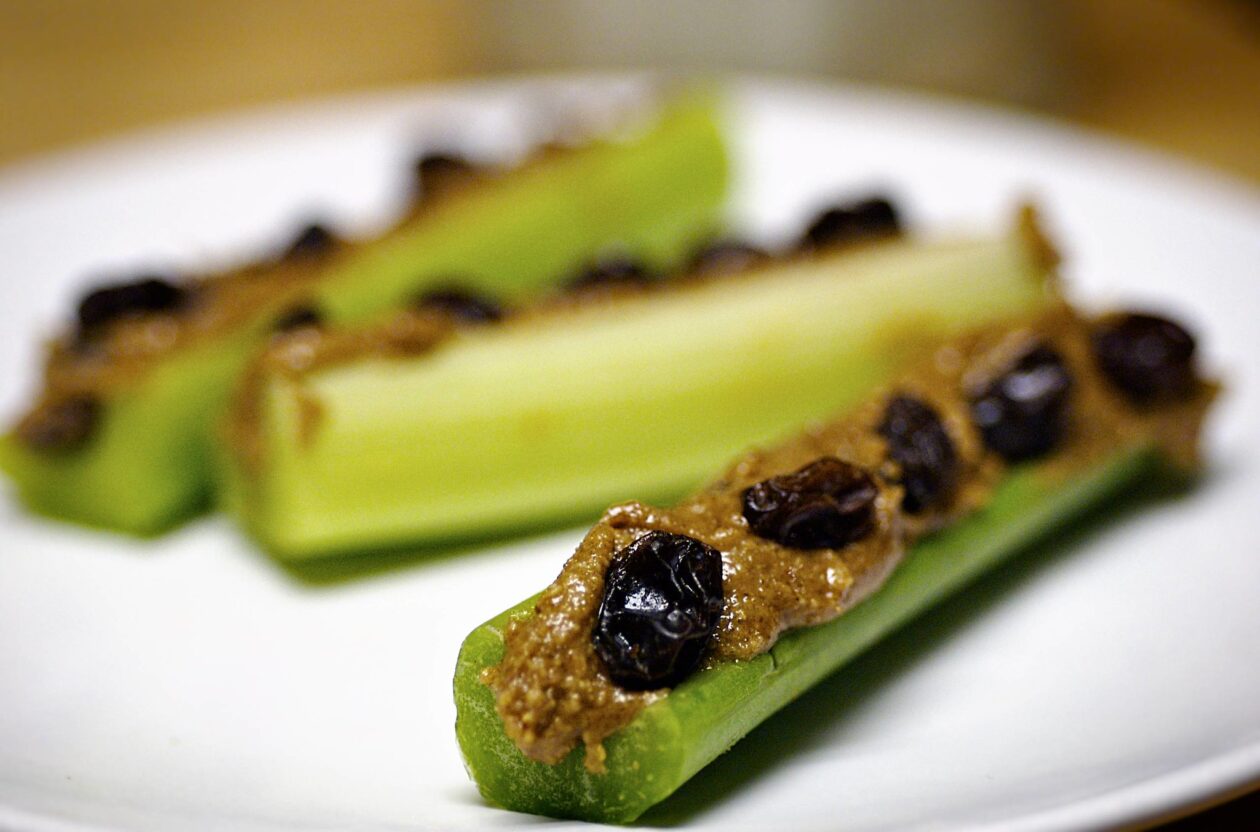




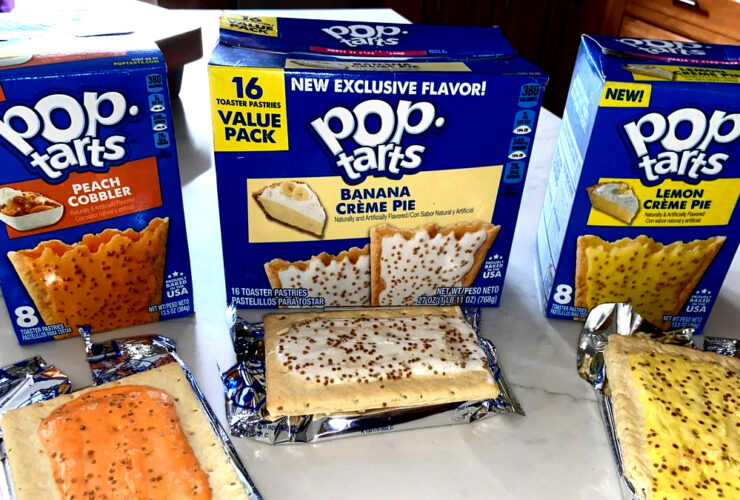


Leave a Reply
View Comments